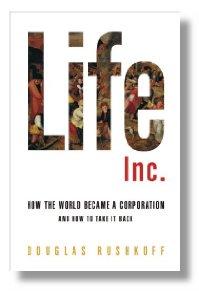Advertisement
Everything Incorporated
Resume
Social critic Douglas Rushkoff is ready to think big in response to the economic crisis still rocking the U.S. and the world. Really big.
Rushkoff thinks we got off track as a society a ways back. About 400 years back.
He’s not against capitalism. But the form we fell into --corporate capitalism -- is killing us, he says. Killing values and communities. Turning us into the “brand that is me." Turning homes into investments and 401k balances into cold barometers of success or failure.
It doesn’t have to be this way, he says.
This hour, On Point: Douglas Rushkoff rethinks our corporatized lives.
You can join the conversation. Tell us what you think — here on this page, on Twitter, and on Facebook.Guest:
Douglas Rushkoff is professor of media studies at The New School University and author of ten books on technology, media and society, including "Cyberia," "Media Virus," "Coercion," "Nothing Sacred," "Get Back in the Box," and the novel "Ecstasy Club." His new book is "Life Inc.: How the World Became a Corporation and How to Take It Back." You can read excerpts here.
Update: We asked Douglas Rushkoff if he'd write a quick post-show followup note before he left, responding to some of the comments here. Of course, just as he sat down to read them, our server slowed to a standstill. So he emailed us the following:
As luck would have it, the non-corporate server for the OnPoint website is acting up just as I sit here to participate in the blog comments section.
But I have a pretty good sense of the main objections to what I'm talking about - and part of it, I believe, stems from the incorrect impression that I'm against corporations. That's not quite true. If I'm against anything, it's the way the landscape - both legal and social - has been tilted towards large corporate activity and away from direct interaction and transaction between people.
Yes, we (the wealthy among us, anyway) have free choice of how we live our lives - but that only forces us to ask the question of why and how so many of us make the choices we do.
This is not idle chatter about values. What I'm asking people to do is look at the logic embedded in the financial structures and mechanisms we use. It may not coincide with our best notions of how to operate our world.
Update: Scroll down to read further comments from Rushkoff in the thread below...
This program aired on June 2, 2009.